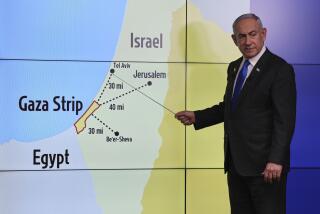Clinton Says He’s Not Satisfied on POWs : Diplomacy: He rules out early end to trade embargo against Vietnam, saying, ‘We’re not there yet’ on missing Americans.
- Share via
WASHINGTON — President Clinton on Friday ruled out an early lifting of the trade embargo against Vietnam, saying he is not convinced that Hanoi is doing everything possible to resolve the question of Americans still listed as missing nearly 20 years after the Vietnam War.
But declaring that documents newly obtained from Vietnam may help to resolve the fates of at least some missing servicemen, Clinton also said during a news conference that Hanoi is now being “more forthcoming” in accounting for missing Americans than in the past.
“I do believe that we’re making some progress,” Clinton said, adding that he was “encouraged” by the new information that presidential emissary John W. Vessey Jr. brought back from Hanoi this week.
Clinton also said that, while the new information should help answer “some of the questions” about unsolved POW-MIA cases, “I cannot say that I’m fully satisfied that we know all that we need to know.” The unresolved question of missing Americans has been the primary obstacle to establishing normal U.S.-Vietnamese relations.
Before lifting the embargo or taking other significant steps toward normalization, Clinton said, he would have to be convinced that “we had gone a long way toward resolving every case that could be resolved at this moment in time and that there was a complete, open and unrestricted commitment to continue to do everything that could be done always to keep resolving those cases. And we’re not there yet.”
Clinton confirmed that the new evidence brought back from Hanoi by Vessey, a retired Army general, contradicts information contained in a recently discovered Russian document, which indicated that the North Vietnamese held twice as many American POWs in late 1972 as the 591 they released a few months later.
The new Vietnamese evidence, which includes prisoner lists, sketches of grave sites and data on deaths in captivity, is still being evaluated by the Pentagon, but it “tends to undermine the validity of the Russian document’s claim,” Clinton said.
The document’s discovery in Communist Party archives in Moscow caused a flurry of excitement among POW activists, who said that it proved the Vietnamese have long been lying about the POW issue. A Russian translation of what purported to be a secret report to the Vietnamese Politburo in September, 1972, the Russian document said that 1,205 American POWs were then being held at 11 prisons throughout North Vietnam.
Questions about the document’s accuracy were immediately raised by Pentagon investigators, however, and Vessey cast additional doubt on it upon his return from Vietnam, telling reporters that the Russian document was riddled with inaccuracies.
Pentagon analysts are now examining two new documents obtained from the Vietnamese in an effort to bolster their contention that the Russian document is a fraud. One is a Vietnamese wartime ledger known as the “blue book,” which lists 381 U.S. fliers in the chronological order of their capture from 1964 to the end of February, 1972.
The other document, relayed to U.S. officials in Hanoi on Wednesday, is a contemporaneous list of 495 fliers whom Hanoi recorded as having been captured as of December, 1972. Three of the names on that list were of South Vietnamese or Thai pilots, while 492 were Americans, Vietnamese officials said.
A Pentagon spokeswoman refused to comment on the names or other details contained in either of the new lists, saying that they are still “under evaluation.” However, she added that the second, longer list includes the 381 fliers mentioned in the “blue book” plus all those pilots Vietnam says it captured between February and December, 1972.
Regardless of the outcome of the Pentagon analysis, Clinton’s comments appeared to confirm that, despite pressure from U.S. businesses, the Administration will not lift the 18-year-old embargo on trade with Vietnam before the International Monetary Fund and the World Bank meet later this month to consider extending development assistance to Vietnam.
Dimming hopes of the Vietnamese and the international lenders, Clinton said that the timing of any decision he makes to lift the embargo would be “much more heavily influenced by the families of the people whose lives were lost there or whose lives remain in question than by the commercial interests.”
Times staff writer Jim Mann contributed to this story
More to Read
Sign up for Essential California
The most important California stories and recommendations in your inbox every morning.
You may occasionally receive promotional content from the Los Angeles Times.













